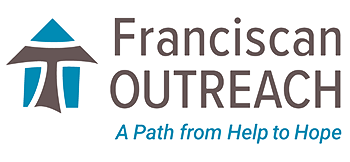
Study Identifies Barriers to Housing for Long-Term Shelter Stayers
Study Identifies Barriers to Housing for Long-Term Shelter Stayers
Franciscan Outreach serves more than 7,600 of our city’s most vulnerable residents throughout the year. Through daily interactions with guests at our five service sites across Chicago, we noticed a growing trend of people staying at our two largest shelters for extensive periods of time. In fact, one-quarter of the 382 people staying at our shelters each night have been staying there for three years or longer.
This is a growing trend among other homeless service providers in Chicago and around the country. People who have extensive shelter stays have become known as “long-term shelter stayers” or LTSS. While people who are LTSS may represent a small proportion of the larger population of people who stay at shelters, they account for a disproportionate amount of shelter bed utilization.
Looking to understand this trend, we connected with Dr. Molly Brown, Ph.D. of the Department of Psychology at DePaul University whose research includes examining the reliability and validity of vulnerability assessments for individuals experiencing homelessness, Housing First outcomes, and trauma-informed care practices within homeless service organizations. Dr. Brown was interested in exploring the barriers to housing experienced by people who are LTSS.
Franciscan Outreach also joined together with other homeless service providers in Chicago for a focus group series on strategies to serve individuals who are LTSS. The response indicated a broad interest across the community in addressing the needs of people who are LTSS.
We invited Cornerstone Community Outreach, from Chicago’s North Side, to participate with Franciscan Outreach in a qualitative study conducted by Dr. Brown, Camilla Cummings, M.A. and a team from the Department of Psychology at DePaul University. The study aimed to identify the barriers that influence the ability of LTSS to transition to permanent housing.
The 18-month research study began in 2017 and concluded in 2018. It included one-on-one qualitative interviews with shelter guests identified as staying in a shelter for three years or longer. The study questions focused on LTSS’ experiences with seeking housing, their housing goals, their experiences receiving shelter services, and their perceptions of their barriers to housing.
The DePaul team presented the research findings in March 2019. The study findings were grouped in four broad categories that identified the reported barriers to housing by LTSS participants. The categories include:
- Individual-Level Barriers: Participants identified economic resource issues (e.g., lack of income, or employment), health factors (e.g., physical and mental health issues), criminal justice system involvement, and ineffective strategies for seeking housing as barriers to housing.
- Interpersonal-Level Barriers: Participants identified a lack of social support and mistrust (e.g., numerous encounters with service systems influence their ability to trust) as two key barriers to housing.
- Community-Level Barriers: Participants described problems in the community such as gentrification, issues related to race and segregation, and limited housing options based on their life histories (e.g., fear of being displaced from locations with access to jobs, transportation, and services they rely on) as barriers to housing.
- Systems-Level Barriers: Participants identified institutional policies (e.g., challenges navigating systems), the “waiting game” of trying to obtain public or subsidized housing, lack of transparency of the system, lack of affordable housing, and systems preventing providers from helping (e.g., larger systematic barriers) as key barriers to housing.
The research study found that participants expressed clear goals for obtaining health care, employment, and housing. However, the barriers cited have made achieving these goals difficult.
The research study concludes with sound recommendations based on the research for homeless service providers to consider. Franciscan Outreach is focusing on the recommendations as part of a plan to develop a Long-Term Shelter Stayers Initiative in 2020.
Read the full LTSS research study report.
